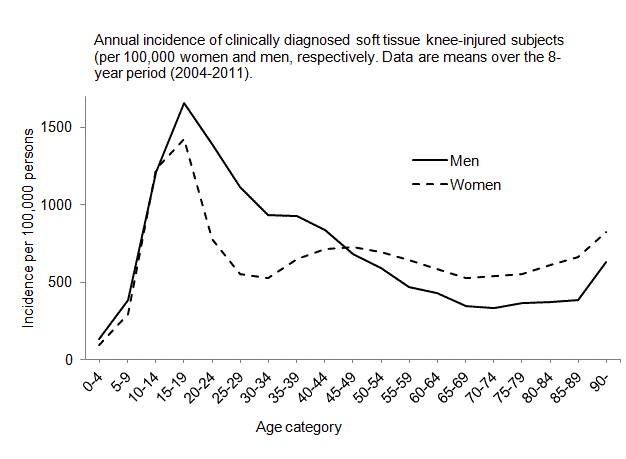Session Information
Session Type: Abstract Submissions (ACR)
Background/Purpose: Soft tissue knee injury is a well-established and potent risk factor for development of knee osteoarthritis. However, there is a paucity of epidemiological data from the general population. Our aim was to address this gap using data from a large, regional health care register, i.e., to estimate the annual incidence of clinically diagnosed soft tissue knee-injured subjects in the entire population.
Methods: In Sweden, in- and outpatient health care is registered using each individuals’ unique personal identifier. This register includes information on date of visit and the International Classification of Diseases (ICD) 10 diagnostic code(s) as determined by physicians’ clinical examination. For the calendar years 2004-2011, we studied the population in southern Sweden, Skåne County (approx. 1.2 million individuals). We identified residents who had at least one visit to a physician with clinically diagnosed knee contusion (S80.0) or knee dislocation/distortion (S83 and all subdiagnoses). Consequently, knee fractures were not included. To calculate the annual cumulative incidence of clinically diagnosed soft tissue knee-injured subjects, stratified by age- and sex, the number of diagnosed patients during the calendar year formed the numerator of the rate and the population at risk at the start of the year, compensated for patients seeking private care (due to missing diagnostic codes), was the denominator. We then calculated the mean annual cumulative incidence over the 8-year period. In a second step, we investigated potential seasonal variations.
Results: The overall incidence of clinically diagnosed soft tissue knee-injured subjects was 718 per 100,000 per year (672 per 100,000 women and 766 per 100,000 men). The most frequently diagnosed injuries were contusion of knee (31.3% of subjects) followed by sprain and strain of knee (27.7%), injury to multiple structures of knee (22.3%), tear of meniscus (11.3%), collateral ligament injury (10.7%), and cruciate ligament injury (9.9%). The highest incidence of knee-injured subjects was found in those aged 15 to 19 years for both sexes (1424 per 100,000 women and 1658 per 100,000 men). After this age, there was a general decline but with an increase again in the incidence in the most elderly (figure). We found substantial seasonal variations in both genders with peaks in March-May and August-October.
Conclusion: Clinically diagnosed soft tissue knee injury occurs with marked age and seasonal variations. The high incidence among young people warrants further attention as the potential induction point for many cases of post-traumatic knee osteoarthritis.
Disclosure:
C. Bergknut,
None;
G. Peat,
None;
R. Frobell,
None;
M. Englund,
None.
« Back to 2012 ACR/ARHP Annual Meeting
ACR Meeting Abstracts - https://acrabstracts.org/abstract/population-incidence-of-soft-tissue-knee-injury-estimates-from-a-swedish-health-care-register/

